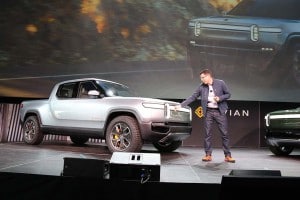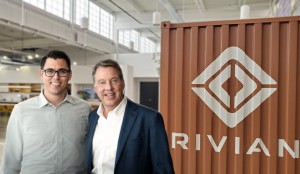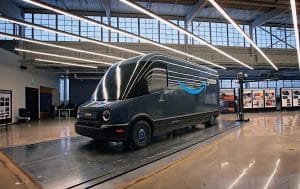
Rivian Founder RJ Scaringe, showing off the the R1T all-electric pickup a few years ago, has managed to secure additional investments in the company.
The faith of investors in electric vehicles keeps on growing with Rivian being the latest to secure a bundle of cash: $2.5 billion led by T. Rowe Price.
Rivian’s influx of new funds comes just a day after Fisker Inc. revealed it received $50 million in new funding to help put its Ocean battery-electric SUV into production, and may yet sell the company to facilitate a public offering to raise even more cash. Other EV makers have enjoyed renewed financial support in recent weeks as well.
Nikola Corp. completed its merger with VectoIQ Acquisition Corp. netting $700 million in cash and a new ticker symbol – NKLA.O – and then saw is stock shoot up immediately. It’s also impossible to ignore continued rise of Tesla’s stock price, which is well above $1,000 a share now, giving it the largest market cap of any automaker in the world.
(Fisker sale in the works, could take company public.)
Rivian has done pretty well in terms of attracting investors to help with the development of its R1T and R1S electric pickup and sport-utility vehicle. The latest round of money follows a steady stream of funding during the last 18 months.

Rivian founder and CEO RJ Scaringe and Ford Chairman Bill Ford Jr. are all smiles after the announcement that Ford Motor invested $500 million.
In 2019 alone, the company saw at least $2.8 billion in new money from investors, starting:
- In February, Rivian announced a $700 million funding round led by Amazon.
- In April, Rivian announced that Ford Motor Co. invested $500 million and that the companies would collaborate on a future program.
- In September, Cox Automotive announced its $350 million investment in Rivian, complemented by plans to collaborate on logistics and service.
- In late September, Rivian announced it was developing an electric delivery van for Amazon utilizing Rivian’s skateboard platform and that 100,000 of these vans had been ordered with deliveries starting in 2021.
- In December, Rivian closed an investment round of $1.3 billion. The financing was led by funds and accounts advised by T. Rowe Price Associates, Inc. with additional participation from Amazon, Ford Motor Company and funds managed by BlackRock.
The new round takes total investment in Rivian to at least $6 billion, according to Reuters. Rivian’s latest fundraising was joined by Soros Fund Management, Coatue Management, Fidelity Management and Research Company, and Baron Capital Group. Amazon and BlackRock also participated.
(Lincoln, Rivian scrub Lincoln EV project due to coronavirus.)
“We are focused on the launch of our R1T, R1S and Amazon delivery vehicles. With all three launches occurring in 2021, our teams are working hard to ensure our vehicles, supply chain and production systems are ready for a robust production ramp up. We are grateful for the strong investor support that helps enable us to focus on execution of our products,” said Rivian Founder and CEO RJ Scaringe.

Rivian and Amazon offered some behind-the-scenes views of the new electric delivery van they’re developing. Amazon has invested millions in Rivian.
Clearly producing an electric vehicle costs big money, and Rivian has done well in that arena, which is often difficult to do. While Rivian and the aforementioned companies, and others like Lordstown Motors, which took over General Motors’ old plant in Lordstown, Ohio, and plans to begin producing electric pickups early next year, are getting what they need. Others are struggling.
Last month, Chinese EV startup Byton announced it was suspending its operations for six months because, it was out of money. Best known for the 48-inch video display topping the instrument panel of its M-Byte SUV, Byton seemed poised for success as recently as last winter, the company showing off a production version of the electric ute at the 2020 Consumer Electronics Show in Las Vegas.
Additionally, Byton had completed its assembly plant in China and even won the coveted license from government regulators needed to go into production. But then the coronavirus pandemic struck and, as the Chinese market was forced into lockdown, things turned south.
(Byton suspends operations for six months, but revival seems unlikely.)
Byton’s not alone, potentially following in the footsteps of Faraday Future, which had to abandon work on its original plant near Las Vegas. LeEco has effectively folded, as have other automotive wannabes. Another Chinese enterprise, Nio, was working in fits and starts until an investor came along at the last minute to pull it out of its morass, but there’s no guarantee it won’t end up back in that spot again.
